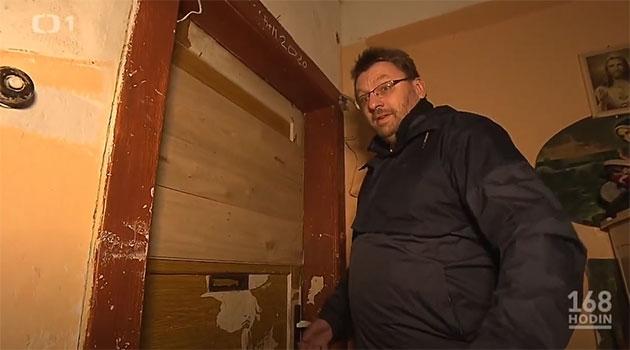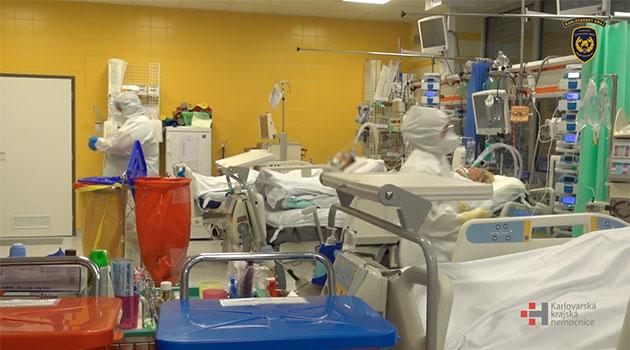Czech TV finds MP is still a landlord trafficking in poverty, overcharging Romani tenants for squalid properties who have nowhere else to go

Czech MP Lubomír Volný is continuing to make money on the most impoverished Romani residents of the excluded locality in Ostrava-Přívoz where he owns two buildings that he is neglecting. Currently he has been drawing attention to himself by refusing to follow the rules in place during the pandemic and has become a star among those opposed to wearing facemasks – and paradoxically, many Romani men and women are praising him for that on social media.
“If you call me a trafficker in poverty, I won’t extend the Romani tenants’ leases”
Just as he did two years ago, the MP is responding to the critique of his exploiting impoverished people for his own benefit by threatening to evict his Romani tenants. That was his response when he was questioned by reporter Martin Mikule on the Czech Television program “168 Hours” (168 hodin).
Mikule asked the MP repeatedly whether he was ashamed to rent housing that is absolutely substandard to these tenants. “If you, as a public broadcasting reporter, ask me one more time whether I’m ashamed because they have been destroying the housing, I won’t extend their rental contracts and it will be your fault,” the MP said on camera, to which the reporter responded that Volný was using the tenants as a “human shield”.
The Czech Television report points out that socially vulnerable people or single heads of households are moving more and more into temporary hostel-style accommodation or apartment units that are substandard, and not just because of the influence of the pandemic. The owners of standard apartment units frequently refuse to rent their real estate to such tenants, who end up on the outskirts of towns or in excluded localities where they pay exorbitant rents for poor-quality housing and sign rental contracts that are disadvantageous to them.
VIDEO
Among members of the Romani community, discrimination plays an essential role in what kind of rental housing they can find, and they encounter rejection on the basis of their ethnicity. The traffickers in poverty make money on the business in temporary hostel-style accommodation because significant amounts of public money are spent on it through the welfare programs that contribute to such tenants being housed in localities where the cost of rent does not correspond to the quality of the property rented.
Martin Šimáček, director of the Center for Social Services in Prague (Centrum sociálních služeb Praha), has long warned that people living in temporary housing pay far more for rent than they would in regular rental housing. Of course, the problem is that landlords refuse to lease regular units to Romani tenants or people on welfare.
“The owners will not offer to rent those people their units because they have concerns about those target groups. At the same time, municipalities and towns are not playing their own roles well if they cannot manage to offer a public housing alternative. The state itself is not creating conditions for more affordable apartments and social housing to be built that could be offered to these people by municipalities,” Šimáček told public broadcaster Czech Television, referencing the problem of some landlords getting rich off of state housing benefits by renting units exclusively to people in adverse situations who have ended up in a position of disadvantage for different reasons.
Millions being made off of poverty – CZK 16 000 [EUR 600] to live in a ruin
Volný is a businessperson and unaffiliated MP who is exactly one such landlord. The public became aware of him when he was recently “messing around” during a physical scuffle over control of the speaker’s microphone in the lower house.
For eight years, Volný has been renting out units in two buildings in the excluded locality of Ostrava-Přívoz, where most residents are Romani people who draw welfare. The MP rents out two larger houses on Božkova street where the rooms have been divided up into apartment units.
The buildings are three-storey villas from the First Republic (early 20th century) and are located in what was once a much sought-after neighborhood near the main train station, but today they look like ruins that the structural engineers responsible for licensing housing should be preventing people from even entering, much less allowing families with young children to live in them. Be that as it may, it is common to see children playing on the unsecured balcony of one of those devastated houses, a balcony that could just collapse at any time and crash several meters right onto the unsecured garbage rolling around on the street around the house.
An amazing amount of money is being paid by the state for an unmaintained three-room unit in these dilapidated houses. When asked by the Czech Television reporter why he would not say how much he charges for rent, MP Volný initially did not want to make any kind of statement.
After the reporter directly asked whether he charges CZK 17 000 [EUR 650], the MP answered that it was not that high. “The rent is not CZK 17 000 for a three-room apartment, he told the “168 Hours” program.
“That is the total amount paid by a 15-member family including all of their energy consumption,” Volný said. The tenants to whom the unaffiliated lawmaker is renting the units gave different answers to that question.
“Altogether with the power I pay CZK 16 000 [EUR 600]. Of that, the electricity is CZK 2 500 [EUR 95], we do not have any gas here,” said tenant Lukáš Karala when asked that question by CNN Prima News.
Karala, unlike another tenant interviewed, praised Volný as a landlord and said he is glad to have found housing for his 10-member family at all. Tenant Marián Gorol was more critical of the quality of the housing and said it bothered him that the water had been turned off for two days and that the common areas and garden are full of garbage.
The social welfare department pays Volný CZK 16 000 [EUR 600] per month on Gorol’s behalf, which is meant to cover utilities and other services. Those payments for the rent are sent directly to the landlord’s bank account every month from the welfare benefits awarded to the tenants.
These are, therefore, not tenants who are not paying rent, nor do they owe back rent. The rental contracts are always month-to-month, a typical practice of traffickers in poverty.
According to CNN Prima News, last year Volný was paid CZK 2 173 220 [EUR 83,101.64] total by the Czech state through these exorbitant rents, his salary as a lawmaker, and what are called legislators’ reimbursements. For far better apartments that are in good condition, including partially-furnished ones, the owners of such small-scale real estate in Ostrava usually ask about CZK 6 000 [EUR 230] per month.
In other words, Romani families are paying rents on Božkova Street that are equivalent to those being charged for available apartments in Prague. Nothing has been repaired in the Božkova Street houses the entire time they have been on the rental market – missing window panes are covered with pieces of cardboard, the exterior plaster has been worn down to the brick beneath it, and the corridors in the houses have been devastated.
The MP, who is not taking care of his properties at all, naturally blames the tenants for the desolate state of the buildings. “They are living in what they themselves have caused,” he accused them on national television.
“I really do not go there in the evening to destroy the doors, the kitchen counters, the toilets and so forth. I don’t peel off the plaster or steal the gutter pipes,” the MP said.
“I will not invest one more crown into improving the quality of housing for somebody who does not know how to live in it. The state of my houses is the calling card of the Romani community, it is the calling card of their culture in the Romani neighborhoods,” he alleged.
“This is also the calling card of all the Romani nonprofits and their absolute failure,” the landlord told the cameras. The Ostrava native was born there on 3 July 1973.
He is a graduate of the Faculty of Pedagogy at Ostrava University in the Department of Physical Education and Technical Training. He used to work as a teacher in the primary schools before spending many years abroad and going into business.
